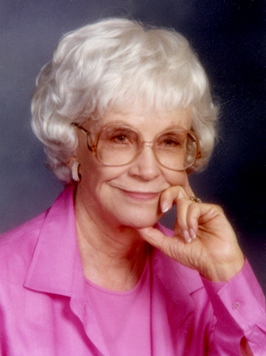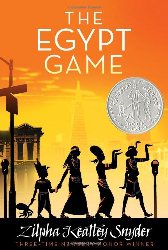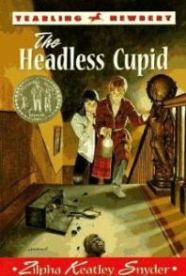2018 School Spending Survey Report
Three-time Newbery Honoree Zilpha Keatley Snyder Dies at 87
Three-time Newbery honoree Zilpha Keatley Snyder, best known for her middle-grade mystery The Egypt Game, died on October 8. She was 87.
 Three-time Newbery Honoree Zilpha Keatley Snyder died on October 8. She was 87. Beloved in the world of children’s literature, Snyder received her Newbery Honors for The Egypt Game (1967), The Headless Cupid (1972), and The Witches of Worm (1972, all S. & S.), vivid, evocative, and dark works for middle-grade readers. One of her earliest titles, The Egypt Game, is centered on the intense fantasy life of a group of children who reenact ancient Egyptian practices and rituals in an empty lot, while in the background, a child murderer lurks. The novel was remarkable not only for its eerie, absorbing narrative but also for its inclusivity. Snyder’s editor Karen Wojtyla, vice-president and editorial director at Simon & Schuster’s Margaret K. McElderry Books, praised the author’s commitment to diversity: “[Snyder created] for The Egypt Game a multiracial cast of characters that was unusual in the 1960s. And she held her ground; when Walt Disney wanted to buy movie rights to The Egypt Game but refused to guarantee a multiracial cast, she refused to sell him the rights.” Snyder was born in Lemore, CA, in 1927 and spent her childhood surrounded by animals: horses, cows, goats, dogs, and cats. An imaginative child, she often anthropomorphized the world around her, giving personalities and lives to plants, animals, and spirits. She found her hobby both disturbing and fascinating, describing on her website: “I built leafy shelters for homeless insects, doctored demons, most of whom haunted closets and the dark corners of rooms. Although they really frightened me, I don't think I would have wanted to be talked out of them. They were my demons, and we had a working relationship.”
Three-time Newbery Honoree Zilpha Keatley Snyder died on October 8. She was 87. Beloved in the world of children’s literature, Snyder received her Newbery Honors for The Egypt Game (1967), The Headless Cupid (1972), and The Witches of Worm (1972, all S. & S.), vivid, evocative, and dark works for middle-grade readers. One of her earliest titles, The Egypt Game, is centered on the intense fantasy life of a group of children who reenact ancient Egyptian practices and rituals in an empty lot, while in the background, a child murderer lurks. The novel was remarkable not only for its eerie, absorbing narrative but also for its inclusivity. Snyder’s editor Karen Wojtyla, vice-president and editorial director at Simon & Schuster’s Margaret K. McElderry Books, praised the author’s commitment to diversity: “[Snyder created] for The Egypt Game a multiracial cast of characters that was unusual in the 1960s. And she held her ground; when Walt Disney wanted to buy movie rights to The Egypt Game but refused to guarantee a multiracial cast, she refused to sell him the rights.” Snyder was born in Lemore, CA, in 1927 and spent her childhood surrounded by animals: horses, cows, goats, dogs, and cats. An imaginative child, she often anthropomorphized the world around her, giving personalities and lives to plants, animals, and spirits. She found her hobby both disturbing and fascinating, describing on her website: “I built leafy shelters for homeless insects, doctored demons, most of whom haunted closets and the dark corners of rooms. Although they really frightened me, I don't think I would have wanted to be talked out of them. They were my demons, and we had a working relationship.”  Books, too, were an integral part of Snyder’s world, and she learned to read at age four. Feeling like an outcast growing up, she often took solace in the printed word. In an interview with poet Lee Bennett Hopkins in his More Books by More People: Interviews with Sixty-five Authors of Books for Children (Citation, 1974), she said that “I think I read almost a book a day during my childhood and loved every minute of it, so you can imagine that as soon as it occurred to me that books were written by ordinary human beings, I decided that was the kind of human being I'd like most to be." After graduating Whittier College in 1948, she was still committed to her goal of becoming a writer, but it was an ambition she put on hold, instead working as a teacher for the next nine years in Berkeley, CA. She married in 1950 and with her husband, Larry Snyder, had two children and also adopted a foster child. In the early 1960s, however, with her children in school, Snyder rekindled her dream of writing. Though she had always assumed she would write for adults, she realized that her years of teaching had given her an appreciation for the emotional life of children, especially at ages 10 and 11, which she described on her website as “a magical time—when so much has been learned, but not yet enough to entirely extinguish the magical reach and freedom of early childhood.” She made her debut in 1964 with Season of Ponies (S. & S.), a novel about a lonely young girl who encounters a herd of mysterious and magical, horses—and one that clearly evoked her own childhood experiences, launching a long and storied career that would last decades.
Books, too, were an integral part of Snyder’s world, and she learned to read at age four. Feeling like an outcast growing up, she often took solace in the printed word. In an interview with poet Lee Bennett Hopkins in his More Books by More People: Interviews with Sixty-five Authors of Books for Children (Citation, 1974), she said that “I think I read almost a book a day during my childhood and loved every minute of it, so you can imagine that as soon as it occurred to me that books were written by ordinary human beings, I decided that was the kind of human being I'd like most to be." After graduating Whittier College in 1948, she was still committed to her goal of becoming a writer, but it was an ambition she put on hold, instead working as a teacher for the next nine years in Berkeley, CA. She married in 1950 and with her husband, Larry Snyder, had two children and also adopted a foster child. In the early 1960s, however, with her children in school, Snyder rekindled her dream of writing. Though she had always assumed she would write for adults, she realized that her years of teaching had given her an appreciation for the emotional life of children, especially at ages 10 and 11, which she described on her website as “a magical time—when so much has been learned, but not yet enough to entirely extinguish the magical reach and freedom of early childhood.” She made her debut in 1964 with Season of Ponies (S. & S.), a novel about a lonely young girl who encounters a herd of mysterious and magical, horses—and one that clearly evoked her own childhood experiences, launching a long and storied career that would last decades.  A thread of magic ran through many of her other books, which expertly balanced the realistic and mysterious: in The Headless Cupid, an 11-year-old boy copes with his father’s remarriage, as well as a move to a strange new, gothic home along with a new stepsister obsessed with witchcraft and the occult. Similarly, her haunting novel The Witches of Worm centered on a lonely girl who comes to believe the cat she adopted is possessed. Though best known for her mysteries, Snyder branched out into historical fiction, science fiction, and YA, publishing more than 40 books in total. Though her output dropped off in more recent years, she still continued to write. Her recent books include The Bronze Pen (2008), William S. and the Great Escape (2009), and William’s Midsummer Dream (2011, all S. & S.). Her novels made their mark, garnering her both praise and criticism—The Headless Cupid made the American Library Association’s list of the 100 most frequently challenged books for 1990–2000 because of its themes of witchcraft. Snyder attributed her creative talents to her ability to derive inspiration from varied sources: the idea for her first novel came to her in a dream; The Egypt Game was born from a combination of Snyder’s own childhood and a game her daughter enjoyed playing; the characters were inspired by some of her own students. In a note she gave to poet and colleague, Lee Bennett Hopkins, she said, “Story ideas develop out of anything and everything—dreams, chance meetings, brief experiences, haunting memories, nagging curiosities, or even from a fascinating place that suggest a good story setting." Hopkins said of the author that she “was a delight to know. Her wit was astounding. One never knew what anecdote would flow from her at an instant moment.” Wojtyla, too, remembers the author fondly: “She was easy to work with, full of ideas, open to suggestions, relishing the backing and forthing of the editorial process. But she could also be a stubborn champion of her characters and their unique voices. I will personally miss [Snyder] enormously, but she will be missed by a much larger community of readers around the world. Thank heavens we have such a wonderful body of her work to laugh and cry over and simply enjoy and relish for years and years to come.”
A thread of magic ran through many of her other books, which expertly balanced the realistic and mysterious: in The Headless Cupid, an 11-year-old boy copes with his father’s remarriage, as well as a move to a strange new, gothic home along with a new stepsister obsessed with witchcraft and the occult. Similarly, her haunting novel The Witches of Worm centered on a lonely girl who comes to believe the cat she adopted is possessed. Though best known for her mysteries, Snyder branched out into historical fiction, science fiction, and YA, publishing more than 40 books in total. Though her output dropped off in more recent years, she still continued to write. Her recent books include The Bronze Pen (2008), William S. and the Great Escape (2009), and William’s Midsummer Dream (2011, all S. & S.). Her novels made their mark, garnering her both praise and criticism—The Headless Cupid made the American Library Association’s list of the 100 most frequently challenged books for 1990–2000 because of its themes of witchcraft. Snyder attributed her creative talents to her ability to derive inspiration from varied sources: the idea for her first novel came to her in a dream; The Egypt Game was born from a combination of Snyder’s own childhood and a game her daughter enjoyed playing; the characters were inspired by some of her own students. In a note she gave to poet and colleague, Lee Bennett Hopkins, she said, “Story ideas develop out of anything and everything—dreams, chance meetings, brief experiences, haunting memories, nagging curiosities, or even from a fascinating place that suggest a good story setting." Hopkins said of the author that she “was a delight to know. Her wit was astounding. One never knew what anecdote would flow from her at an instant moment.” Wojtyla, too, remembers the author fondly: “She was easy to work with, full of ideas, open to suggestions, relishing the backing and forthing of the editorial process. But she could also be a stubborn champion of her characters and their unique voices. I will personally miss [Snyder] enormously, but she will be missed by a much larger community of readers around the world. Thank heavens we have such a wonderful body of her work to laugh and cry over and simply enjoy and relish for years and years to come.” RELATED
RECOMMENDED
CAREERS
The job outlook in 2030: Librarians will be in demand
CAREERS
The job outlook in 2030: Librarians will be in demand
ALREADY A SUBSCRIBER? LOG IN
We are currently offering this content for free. Sign up now to activate your personal profile, where you can save articles for future viewing






Add Comment :-
Be the first reader to comment.
Comment Policy:
Comment should not be empty !!!